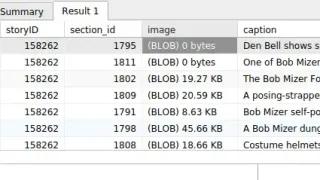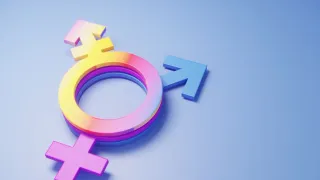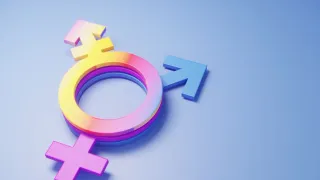July 25, 2014
A Dark Paradise :: Lana Del Rey, the Saddest Bad Girl Around
Jason St. Amand READ TIME: 7 MIN.
When Lana Del Rey first took the Internet by storm in 2011, she was billed as "the gangsta Nancy Sinatra" and "Lolita lost in the hood." On her breakout single "Video Games," a song about the desperateness of trying to repair a broken relationship, Lana asks her man if he likes bad girls, hoping that persona will make him love her. And when Born to Die hit shelves a year later, she hammered her image into pop culture's consciousness as nearly all 15 tracks are about the struggles of being a troubled bad girl.
It also helped that in between album cycles, there were countless photo shoots with flowers in her hair, bees in her mouth, men groping her and tons of vintage clothes. Between her Americana-with-an-edge tropes splattered across fashion magazines, her cinematic music videos and the negative press she got for being an alleged calculated/manufactured pop star, Lana's bad girl image only strengthened.
In June, she released her highly anticipated Born to Die follow-up, Ultraviolence. It's a ballsy and vulnerable album that finds the singer exploring some of the same themes as her previous efforts but channeling a new sound. She's moved out of glamour Hollywood of the early '60s and into the psychedelic late '60s. The sweeping string arrangements are limited and there are no hip-hop beats. Instead, Del Rey summons the help of Dan Auerbach, half of the Grammy Award-winning rock band Black Keys, and his production thumbprint is prominent throughout the LP.
Lana isn't asking if she should be a bad girl anymore -- she's telling us that's who she is. On standout track "Sad Girl," a song about reconciling the ups and downs of being a mistress, she hypnotically chants with detached vocals, "I'm a sad girl / I'm a bad girl" over and over. Lana Del Rey is like a razor blade wrapped in velvet, and Ultraviolence is basically an album for the women of Russ Meyer's Faster, Pussycat! Kill! Kill! to listen to when they're down in the dumps.
In an extensive interview with the Fader, Del Rey admits she's playing a character. The real life Lana Del Rey, Elizabeth "Lizzy" Grant, has a boyfriend and comes from money. But there is a dark streak in her personal life that finds its way into the music of Lana Del Rey. Her troubled relationship with men, violence, addiction and struggle with power are themes that appear most often in the 27-year-old singer's music, like on the downtrodden but booming album opener "Cruel Word."
On the title track, presumably taken from the classic Anthony Burgess novel "A Clockwork Orange", she says her nickname is D.N., for "deadly nightshade," and she is "filled with poison but blessed with beauty and rage." In the next lyric she says her man, "Jim," "hit me but it felt like a kiss," referencing the 1962 Crystals' song "He Hit Me (And It Felt Like a Kiss)," which was most famously covered by Courtney Love's band Hole on MTV's Unplugged in 1995. "Ultraviolence" is a passionate song about the devastating inner thoughts one has is in the midst of an abusive relationship: "I love you the first time, I love you the last time / Yo soy la princesa, comprende mis white lines (I am the princess, understand my white lines) / Cause I'm your jazz singer and you're my cult leader / I love you forever," goes the spine-tingling spoken-word section of the song.
Like a handful of current songwriters, namely Taylor Swift, Del Rey's lyrics are equal parts reality and fiction with the line between the two blurred. On the drug-fueled bonus track "Florida Kilos," a clever play on Florida Keys, Del Rey is transported to the Sunshine State, chanting, "White palms, baking powder on the stove / Cooking up a dream, turning diamonds into snow," and "White lines, pretty daddy, go ski it." The track is chipper, at least compared with the rest of the record, thanks to filtered guitars and warm synthesizers. It's the most poppy song on Ultraviolence and the most carefree, conjuring up images of Lana palling around with the psychotic girls from Spring Breakers ("Guns in the summertime," she sings at one point) -- director Harmony Korine has writing credits after all.
But that's as upbeat as you'll find Lana here. On single "Shades of Cool," she sings about her drug-abusing man. "But I can't fix him, can't make him better /And I can't do nothing about his strange weather" goes the slow-burning jam that erupts into an epic guitar solo that sounds like it came out of a James Bond soundtrack. Lead single "West Coast" finds Lana missing her lover while she travels around the world, and her stirring cover of Nina Simone's "The Other Woman" wrecks your soul. The haunting bonus track "Black Beauty" should have definitely been included on Ultraviolence's standard edition, and then there's the most Lana Del Rey song ever: "Fucked My Way to the Top." It's a passive-aggressive diss track to an unknown singer (*cough*Lady Gaga*cough*), and to any hater who says Del Rey got to where she is today by questionable routes.
On the LP's best track, "Brooklyn Baby," Lana gets satirical. Like Korine's Spring Breakers, Del Rey captures the zeitgeist and makes any millennial-hipster cringe by holding a mirror up to them when she sings the chorus: "And my boyfriend's in the band, he plays guitar while I sing Lou Reed / I've got feathers in my hair, I get high on hydroponic weed / And my jazz collection's rare, I get down to beat poetry / I'm a Brooklyn baby." Take that, Williamsburg.
Ultraviolence is a grower but ends up being an addicting record, much like Born to Die. Del Rey's voice hasn't changed much; she knows hitting high notes isn't her selling point. Her vocals are deeper in the mix and settle in a cloak of reverb. Those who got on the Lana Del Rey train because of tracks like "Video Games" and "Blue Jeans" will be pleased to see her shift gears from glossy operatic strings to raw and gritty rock 'n' roll, where she calls on the powers of the Velvet Underground, the Beatles and Queens of the Stone Age. In away, this is her 808s & Heartbreak -- a transitional record to get to her next big sound. And like a great Kanye West record, Ultraviolence is splattered with iconography, cleverly referencing art, literature, music and film throughout the album.
But on the whole, the noir Ultraviolence is a downer. It's a record you play on the drive home after breaking up with a boyfriend. It's not a breakup album at all, but it's the perfect soundtrack to wallow in your sadness and fucked-up life. At times you may catch yourself wondering if she even buys into her own bad-girl-sad-girl image, but put those fleeting thoughts to rest.
In a recent Guardian profile of Del Rey, writer Tim Jonze asks the singer "if she sees an early death as glamorous" (she's often named Kurt Cobain, Elvis, Janis Joplin and Amy Winehouse as influences).
"I don't know. Umm, yeah," she says. "I wish I was dead already." When Jonze says she must be kidding, Lana says, "I don't want to have to keep doing this. But I am."
When asked to elaborate she adds, "Everything. That's just how I feel. If it wasn't that way, then I wouldn't say it. I would be scared if I knew [death] was coming, but ..."





